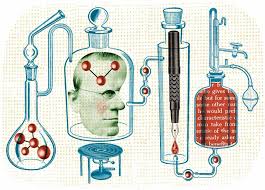3 May 2018 (Rome, Italy) – There is a wonderful website called LabLit.com which is “dedicated to real laboratory culture and to the portrayal and perceptions of that culture – science, scientists and labs – in fiction, the media and across popular culture”.
As noted on the site, it does not generally deal with the genre of science fiction, except in essays which shed light on science in popular culture or realistic science in science fiction, but every now and then it does have some cool science fiction. The site is edited by scientist, novelist and science writer Dr. Jennifer Rohn. She has an “incurable addiction to scientist-related literature”, or “lab lit”, a term she coined in 2001 which is now used widely.
We met at one of the many conferences we attend on “data wrangling” – the process of transforming and mapping data from one “raw” data form into another format with the intent of making it more appropriate and valuable for a variety of downstream purposes such as analytics. You discuss (and learn) how to use many types of media, many types of software, and many different approaches to processing/using data. In other words, a “holistic” endeavour. Two recent sessions were on:
- How Western society is in the grip of a new phenomenon, “metric fixation”. The key components of metric fixation are the belief that it is possible – and desirable – to replace professional judgment (acquired through personal experience and talent) with numerical indicators of comparative performance based upon standardised data (metrics).
- The “hoovering” of personal information, collected up by ever-more-powerful computers, creating ever-more-giant sets of data, at a scale the popular press has not come even close to describing, the Snowden and Facebook/Cambridge Analytica imbroglios notwithstanding.
Both of those factors led me to share this piece.
I met the author of this piece through LabLit. He is João Ramalho-Santos, a biologist living in Coimbra, Portugal. He does a lot of work in experimental biology and biomedicine. A few years ago he began writing graphic novels and sci-fi. One of those pieces was selected by Nature Magazine for their new sci-fi section and I thought fellow “data wranglers” would enjoy it. Oh, and at the end I included a postscript wherein João explains his inspiration to write this piece:
Data: “They’ve got your number”
“Harmony Jones, BDSM.” The jet-black nametag stuck out, hanging in a void of white. The pick-up had been swift, firm; at no point had José felt in danger. Until now. There are very few people, real or mythical, you truly dread meeting, but your personal Big Data Special Manager is in the top three. That they always seemed to have such reassuring names only made matters worse.
The officers from the Data Brigade could have wanted him for many things, unfortunately. Home organization and finding certified hackers had been Lance’s realm, and after the divorce, things had got out of control. José would not be surprised to learn he was late on one payment or another.
It certainly couldn’t help that Lance had been awarded full custody of everything, thanks to allegations of José maliciously increasing data incompatibility, as if he was somehow at fault for them being barely compatible in the first place.
But they had met before partnership validation — and everything else — used sabermatics algorithms, imported from baseball analysis, to make sense of the monstrous loads of data from genomics, transcriptomics, proteomics, metabolomics, epigenomics, socialomics, economylomics, anthropolomics, psychologyomics and behaviouromics that had been lying around since the first quarter of the twenty-first century. Big Data had finally arrived, and, based on everything it could gather on the couple, it foretold a clear story of logical doom for the Sousa–Menzies partnership. Except this was not about Lance. It was much worse.
“I have some testimony to show you,” Harmony Jones said. “Please be aware that all legal guidelines have been followed. Any appeals should be filed after this hearing.”
The film consisted of a collage of events pasted together from security cameras on businesses, traffic lights, bank machines and passing drones. Night morphed into day as José wallowed choppily though his routines and changed clothes every ten seconds; it was like one of those arty found-footage montage movies.
The action sped up and paused regularly, with Harmony Jones calmly asking José to validate whatever it was that the cameras showed. How could he not? The images were impressively vivid, and the software could recognize anyone, even buried under winter attire, even after plastic surgery. Without hacking to ‘normalize’ the data, there was nowhere to hide. And why, indeed, Harmony Jones pointed out rhetorically, would one hide from oneself?
Cameras were not actually the issue: their permanent gaze had been considered a fait accompli for a while. But wireless skin implants that had evolved exponentially from wearable credit cards, designed to avoid carrying valuables in discos and bars, to live health monitors that included miniature RNA sequencing and mass-spectrometry capability were nothing short of a regrettable nanotech marvel. They allowed for oodles of hard biochemical data to be gathered and cross-referenced with softer behavioural patterns in something agonizingly close to real time, so that Harmony Jones could calmly reel off a number of misdemeanours.
“Your actions do not match data recommendations. December 9: you took a brand of pain medication with side effects that did not comply with your psychology profile or heart rate at the time.
“The following day you had three glasses of standard white wine during your seventh straight LonelyThirty Date with no match, when your transaminase activity, urea and reactive oxygen species levels clearly demanded two as the limit, a dose of MitoDiet™ antioxidants or, at the very least, a switch to an above-average red. Also, your serotonin levels, blood flow and brain glucose consumption rates imply that you should have been much happier at that encounter than your behaviour suggests.
“Your exercise habits are beyond pathetic. You blatantly ignore all nutraceutical warnings. And you stubbornly continue to harbour a liking for black liquorice when your polymorphism profile implies that you should favour red …” Harmony seemed to briefly hesitate. “Not all are binding, but you can browse the 976 violations identified in the report at your leisure.”
José tried meekly to counter that he did not contest the data, but merely thought that the interpretation might, perhaps, allow for certain mitigating circums —
“The data are not contestable,” his BDSM intoned. “Your live monitoring patches are complemented by continuous cross-reference from public display cameras. And your life-expectancy and health-prediction algorithms are adjusted to both ageing and biannual epigenome sequencing, with the possibility of certified hacking added in as a wild card.
“Separation grieving from your former partner should be 90.78% resolved at this stage, and as of this morning cannot be factored in. This is precisely why you were selected for intervention. By removing this item from the algorithm, your behaviour is 65.89% at odds with what the data recommend. Upon reaching the 66% mark you will no longer be covered by public insurance.”
She paused for effect.
“And the assets balance suggests you also won’t be able to afford fully private options. Please remember that, in agreement with the Valuable Citizen with Limited Liability Act, we are formally required to have only your best interests in mind. If you truly believe this is unwarranted, I can refer you for assessment by either the Assisted End of Living Unit, on the top floor; or the Indigent Postgraduate Skłodowska-Curie Training Network, in the basement.”
José had no idea what to say at this point, except the usual harping everyone engaged in at parties, about the reduction of people to morsels of data parked in faraway clouds, while secretly hoping their neighbours had a worse ranking than they did.
“I don’t understand the issue,” Harmony smiled in blank politeness. “You are the Data. Of course you are the Data. Whatever else could you be? Be thankful we can measure everything so accurately. It only means that there is now more of you than there ever was. And we cherish every single byte of you.”
* * * * * * * * *
POSTSCRIPT
A note from João:
There are two angles to discuss the writing of Data in my mind. One is very short, has nothing to do with the actual story itself, and doesn’t matter much. But here it is anyway: it was written a good while back, sent out, lost in the ether somewhere, and then accepted in a totally unexpected way. In checking the proofs I read it again as a prodigal story returned, and noted the similarities in thought process to the excellent Black Mirror episode “Hang the DJ”, which I saw months after submitting.
At this point readers should dutifully roll their eyes and sarcastically intone “yeah, sure buddy”. Regardless, this could be the aftermath of that type of scenario, the sad demise of one of the very few non-successful matches — with, and that is the second aspect (more) worth discussing, the adding in of a lot of Big Data considerations mostly focusing on biochemical and molecular biology aspects related to health, metabolism and ageing. Projects I am involved in were, as always, part of the actual ‘scientific’ triggers for the story. That and my interest in baseball as the most relaxing thing before ASMR videos, and constant befuddlement at how advanced statistical analysis (sabermetrics) are used almost blindly to manage teams and games. Stay out of football, please.
As all buzzwords in science (some useful, most not and mere gimmicks created for funding or blatantly political purposes — I know, shocking) suddenly everyone I was collaborating with, in all fields, was working the concept of Big Data and analysis of large data sets into their research. Add that to wearable devices that monitor (and can broadcast) all sorts of things in real time, cameras everywhere (check out The Circle by Dave Eggers, don’t bother with the movie), endless clouds of data storage, clear hacking opportunities, and the unending metrics we still cannot shake… To be completely honest, I felt the need to write in some more obviously ridiculous aspects (BDSM, anyone…?), as it seemed that the immediate plausibility index was higher than I usually like… Of course, another way of looking at it is that ridiculous/dangerous aspects almost always result from well-intentioned (or less so) initiatives to ‘help’ people that involve numerical-based reasoning and (now paperless) paperwork.
However, if the European Union ever launches a Marie Sklodowska Curie Action for the Training of Indigent Researchers (on better fundraising/panhandling strategies, sign-writing workshops, finding cheap lodging alternatives, good dumpster-diving practices and NGO assessment), I will officially consider myself a futurologist. I might even apply.

